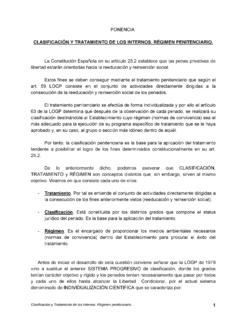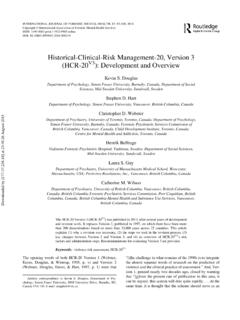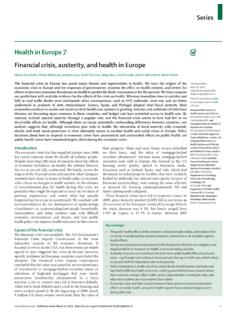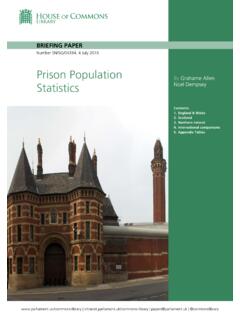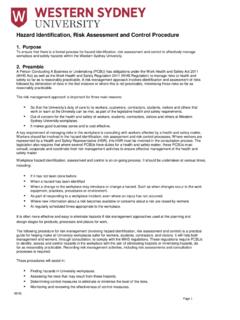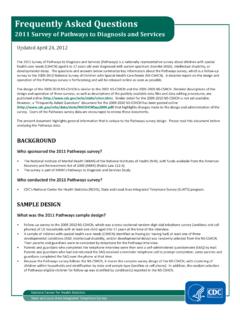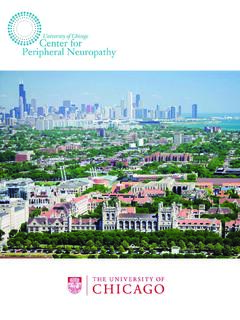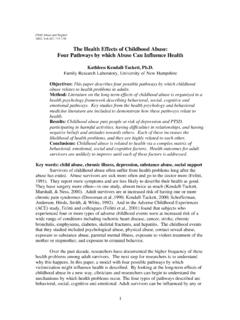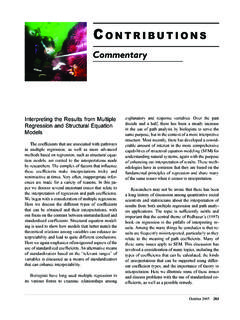Transcription of Family Members’ Experiences with Incarceration …
1 Western Criminology Review 7(2), 20 31 (2006) Family members Experiences with Incarceration and Reentry*Rebecca L. NaserPeter D. Hart Research AssociatesChristy A. VisherThe Urban InstituteAbstract: This paper explores the impact of the Incarceration and return of individuals from prison on their families, including relationships with intimate partners, adult Family members , and children. Based on responses from 247 Family members of Chicago-bound male prisoners interviewed several months after their imprisoned Family members were released, we describe the personal circumstances of the families of returning prisoners, the frequency and type of contact with the imprisoned Family members , and the level of Family support for the former prisoners after release. We discuss some of the hardships the Family members experience during the Incarceration and reentry process, and some of the support networks that these Family members rely upon, as they face challenges associated with prisoner reentry the challenges of supporting a Family member who has recently been released from prison.
2 We also examine areas of assistance and support that Family members of recently released prisoners identified as needed. Findings indicate that these Family members are highly supportive of their formerly incarcerated relative, providing financial and emotional support. But Family members also experience significant hardships during the reentry period, including financial strain and increased anxiety. Finally, we discuss the policy implications of these findings for developing correctional and community programs and offer suggestions for further research on Family issues regarding prisoner words: prisoners, Family , Incarceration , reentry* Acknowledgments: This paper stems from a larger research effort at The Urban Institute involving several other researchers from the Urban Institute s Justice Policy Center. The authors would like to extend their gratitude to Jenny Osborne for her assistance with citations, Tracey Shollenberger and Jennifer Castro for their contributions to the analysis and writing, and Nancy La Vigne for her thoughtful comments.
3 Dr. Alisu Schoua-Glusberg and the staff of the Metro Chicago Information Center (MCIC) collected the data used in this analysis. This research was funded through the generous support of the John D. and Catherine T. MacArthur Foundation, the Woods Fund of Chicago, the Illinois Criminal Justice Information Authority, the Annie E. Casey Foundation, the Rockefeller Foundation, and the Urban Institute. Lastly, we would like to thank the 247 Family members of recently released prisoners who shared their Experiences , opinions, and expectations with us. Without their willingness to share the details of their lives, this study would not be Among the many challenges facing prisoners as they return home is their reunification with Family . For most former prisoners, relationships with Family members are critical to successful reintegration, yet these relationships may be complicated by past Experiences and unrealistic expectations. Research has documented that many Family members of returning prisoners are also wary about their loved ones return from prison and that a significant adjustment in roles is often necessary (Furstenberg 1995; Hagan and Dinovitzer 1999).
4 Family is undoubtedly important to understanding the reintegration process confronting former prisoners. Recent studies indicate that upwards of three-quarters of former prisoners reside, at least initially, with Family members after release (La Vigne, Visher, and Castro 2004; Visher et al. 2004; Nelson, Deess, and Allen 1999). However, little systematic information exists about the nature of Family members relationships with former prisoners. The subject has been virtually ignored in theories of recidivism (for an exception see Waller 1974), although desistance research indicates that the Family may be critical to explaining individual pathways after release from prison (Laub and Sampson 2003; Sampson and Laub 1993). Most former prisoners have extensive Family relationships that are likely affected by their Incarceration and eventual return home. About one-quarter of prisoners are married, about half (55 percent) are parents, and 44 percent lived with at least some of their children before Incarceration (Mumola 2000).
5 Almost one-quarter of Naser & Visher / Western Criminology Review 7(2), 20 31 (2006)21inmate parents have three or more children, and the majority of these children are under age 10 (Mumola 2000). Also, incarcerated parents maintain a surprising level of contact with their children, especially in light of the difficulties introduced by the prison environment. More than 80 percent of prison inmates report having had some kind of contact with their children during their period of Incarceration (Mumola 2000). These Family ties also extend to the period after release. In a study of former prisoners in Chicago, 71 percent reported that support from Family would be important in helping them stay out of prison (La Vigne et al. 2004). Thus, the opportunity to renew and maintain successful relationships with Family may lead to more involvement after release in conventional roles such as parent, spouse, and employee (Edin, Nelson, and Paranal 2004; Sampson and Laub 1993; Uggen, Manza, and Behrens 2004).
6 Existing research provides strong empirical evidence that the Family of a returning prisoner has a significant impact on post-release success or failure indeed, the Family often serves as a buffering agent for the newly released prisoner ( , Irwin 1970). Among the Family influences that may be important is the strength of Family relationships before and during Incarceration , including the frequency of contact during Incarceration , and whether Family provides a pro-social or antisocial influence. Further, the type and level of support offered by Family after release, whether emotional, financial, or other tangible support such as housing and transportation, is likely to influence former prisoners success or failure after release (La Vigne et al. 2004). While much of this research supports a strong correlation between Family ties and post-release success, it fails to address how and why this effect occurs and how the Family is affected by Incarceration and reentry.
7 The Urban Institute s Returning Home study provides the first in-depth analysis of Family members Experiences with Incarceration and reentry by analyzing interviews with 247 persons who had Family members released from prison approximately three months before their interviews. These data enable us to explore several research questions, including: What are some of the consequences of Incarceration and reentry for families? When an incarcerated Family member returns home, what types of support does his Family provide? What challenges do families of returning prisoners face? Upon what support systems and coping mechanisms do these Family members rely? This paper begins with a summary of related literature, followed by a description of how the study sample was selected. We then examine the characteristics and circumstances of the Family members in our study, providing an in-depth look at their demographic characteristics, their relationships with the recently released Family members , the frequency and type of contact they had with their imprisoned Family members during Incarceration , and the hardships and challenges these Family members of returning prisoners experienced.
8 We then explore coping mechanisms and types of internal ( , personal spirituality) and external ( , religious and community organizations) assistance and support upon which these Family members relied. We conclude with a discussion of the implications of these research findings for policy and practice. Related Literature In the same way that most research on former prisoners addresses the prediction of recidivism, research that considers the Family s impact on returning prisoners also almost exclusively focuses on the outcome of recidivism, rather than attempting to understand the complicated social processes through which Family may affect reintegration. Further, our understanding of the role of Family in the reintegration process is based primarily on studies that focus on Family relationships and ties during prison. For example, a remarkably consistent association has been found between Family contact during Incarceration and lower recidivism rates (Adams and Fischer 1976; Arditti et al.)
9 2003; Glaser 1969; Hairston 2002; Holt and Miller 1972; Klein, Bartholomew, and Hibbert 2002; Ohlin 1954). In recent decades, research that has focused on the impact of returning prisoners on their families has concentrated primarily on the effects on children whose parents are incarcerated. These studies have found that the absence of incarcerated parental figures creates emotional and financial strain for children (Adalist-Estrin 1994; Fishman 1983; Hairston 1989; Schneller 1976; Sharp & Marcus-Mendoza 2001; Swan 1981). Surprisingly, few studies examine the Family s general Experiences with the Incarceration and eventual return of a Family member from prison, a perspective that may provide insight into the role of Family in the reintegration process for returning prisoners and enhance our understanding of why some returning prisoners succeed and others do not. Three studies of former prisoners conducted outside the United States provide additional clues about the importance of Family relationships to post-release outcomes.
10 In the early 1990s, 311 male recidivists in the Ontario region completed detailed interviews shortly after their return to prison concerning their lives in the Family members Experiences with Incarceration and Reentry22community preceding the new offense (Zamble and Quinsey 1997). When asked about problems experienced since release, the most common difficulties mentioned were interpersonal conflicts, primarily with heterosexual partners. In the early 1990s, researchers at the University of Oxford conducted a two-year longitudinal study of 130 male property offenders as they transitioned from prison to the community (Burnett 1992). Analysis of post-release interviews revealed that respondents who continued to engage in criminal activity were more likely to have relationship problems, less likely to have children, and more likely to experience conflict with their parents or other relatives than were those who desisted from criminal involvement (Burnett 2004).

